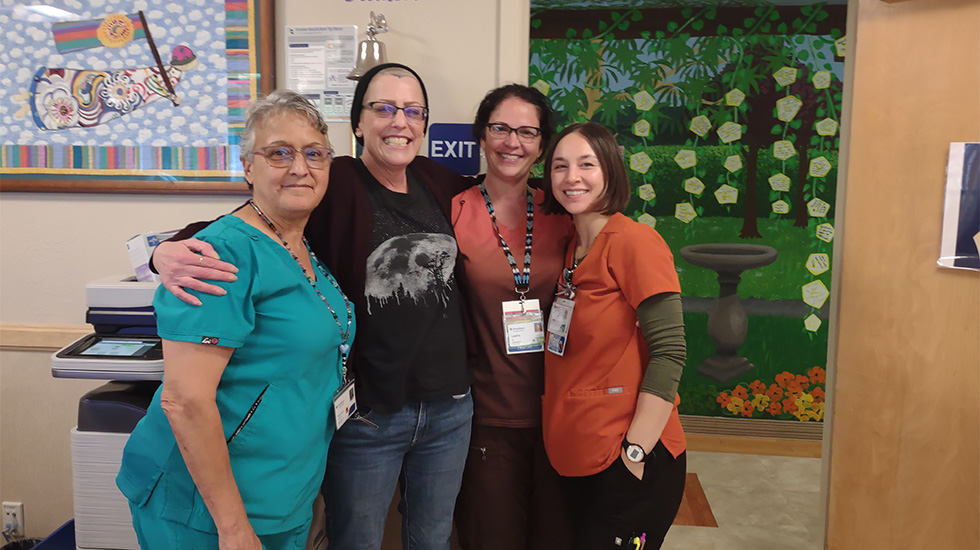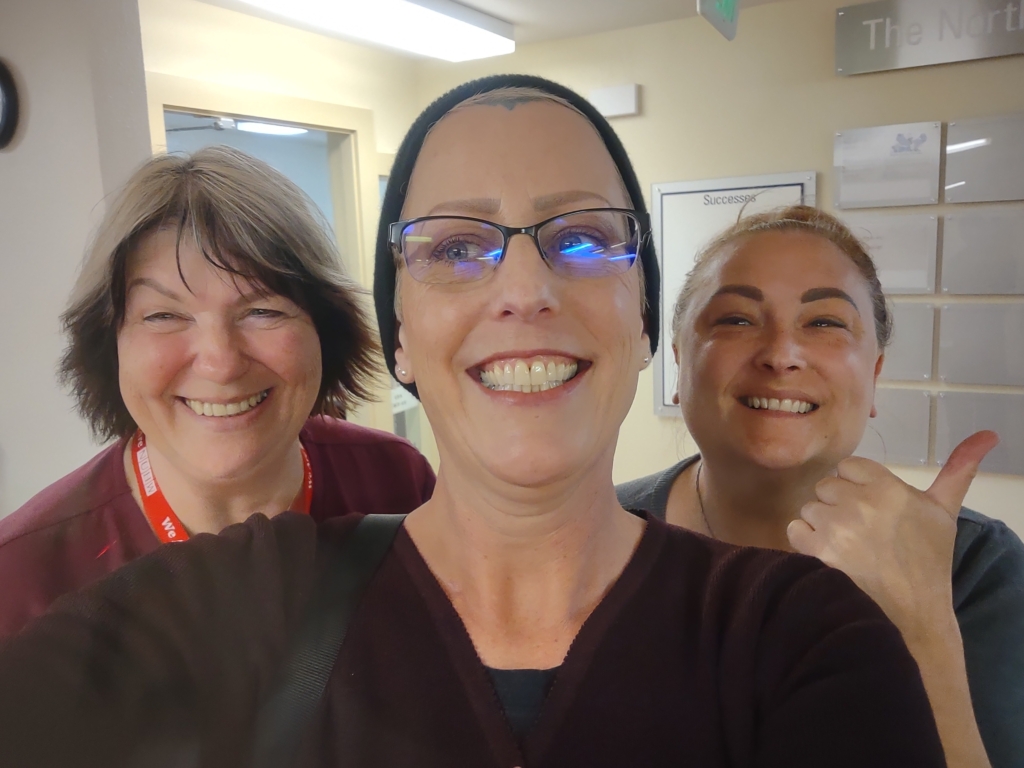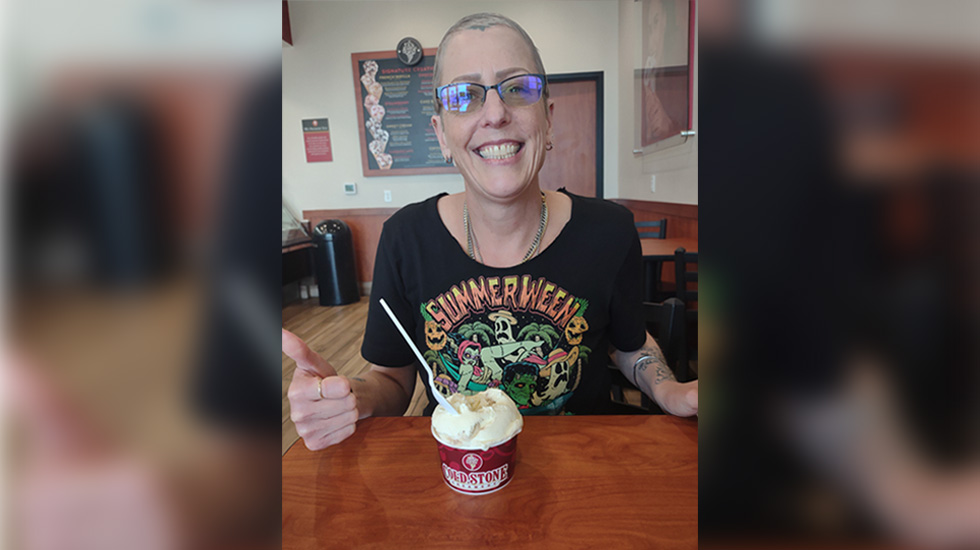


One Monday morning in September 2024, the last thing Tina expected to discover was a lump in her breast. Her surprising discovery led to testing and, eventually, a Stage 3C triple-negative breast cancer (TNBC) diagnosis. Between the initial shock of diagnosis and beginning treatment, Tina connected with her patient navigator, Allie, who made all the difference in Tina’s journey.
When breast cancer entered Tina’s life, it didn’t knock gently. With a family history of breast cancer through her maternal grandmother, Tina knew it was a possibility (a strong family history is a risk factor for developing breast cancer), but her concern level was low. Until it wasn’t: In September, “breast cancer knocked down my front door and changed my life,” Tina shared.
On that Monday morning, Tina was in the shower when she felt a lump in her breast. She tried to brush it off initially, waiting a week before making an appointment with her doctor and telling her husband. But Tina had also skipped her annual mammogram “out of pure negligence,” figuring she’d get to it at a more convenient time, so she knew she needed to get it checked out quickly.
Tina’s diagnostic mammogram didn’t show just one lump; it showed five lumps in her breast and lymph nodes. “I refer to it as the Pac-Man incident,” she explains. “I thought there was one lump, but there was another one, another, and another.” After further testing, Tina was eventually diagnosed with Stage 3C triple-negative breast cancer.
That’s when Tina met Allie, a patient navigator through an NBCF-funded program in her area of Arcata, California.
At first, Tina wasn’t sure what her patient navigator, Allie, actually did. She quickly learned that patient navigators are trained professionals who come alongside patients during their cancer diagnosis and treatment and help guide them through the complex cancer care system.
NBCF-funded patient navigators like Allie help patients overcome barriers to care, such as cost, fear, misinformation, complicated appointment scheduling, understanding medical jargon, and more. Their guidance often ensures women have access to timely diagnosis, treatment, and support throughout their journey.
To Tina, Allie was much more than just a navigator. “Allie is my counselor, my friend, and a wealth of resources and knowledge that has helped me immensely,” Tina says. “Allie has stood by me during chemo, surgery, and soon, radiation.” Navigating a breast cancer diagnosis can feel overwhelming and lonely, but Allie is ensuring that Tina doesn’t have to do it alone or uninformed.
As for the rest of her treatment team, Tina has this to say: “I don’t miss chemo, but I do miss all the wonderful people at my facility who supported me and made me smile along the way. I can’t imagine how difficult their jobs are, but bless them all.”

Reflecting on the last year of her journey with TNBC, Tina shares what breast cancer has taught her and what she wishes she’d known before she was diagnosed. “I wish I’d known that it was going to be an intense, long road, not a short sprint,” she says. “There isn’t a quick fix. Cancer treatment is long-term care that takes time and has multiple approaches to save your life.”
But Tina has discovered some silver linings within her journey, too, in the way her support system has shown up and supported her along the way: “With the help of my support system—my navigator Allie, my family, friends, co-workers, and amazing oncology staff—I know I can survive and thrive during my cancer journey.”
Tina has even more advice for other women facing breast cancer:

While Tina has bad days mixed in with the good, she tries to stay positive and forward-thinking, and encourages others to do the same: “You know the bumper sticker line ‘every day is a gift’? It is. So is dreaming about a better tomorrow, dreaming of the future, and doing the things that YOU want. And then, start doing them!”
Tina’s story and her relationship with Allie underscore that support and guidance can make a critical difference in patient outcomes and experiences with breast cancer. Navigators provide not only practical and administrative assistance to patients, but emotional support and even friendship as well. Tina shares, “I don’t know what I would have done without the assistance of the NBCF Patient Navigation Program. Special consideration goes to my navigator, Allie. She is the light that guided me through.”
National Breast Cancer Foundation is here for you as you navigate a breast cancer diagnosis. Visit our website to learn about NBCF breast cancer support groups, obtain free educational resources, or find a patient navigator in your area.
Donations are always appreciated, but there are lots of great ways to get involved.


She’s my strong and amazing little sister. Very proud of her and very thankful for her coordinator walking with her through this process.
She’s my strong and amazing little sister. Very proud of her and very thankful for her coordinator walking her through this difficult process.
Hang in there my fellow survivor. With God’s help and the support of family & friends we will make it to the finish line.